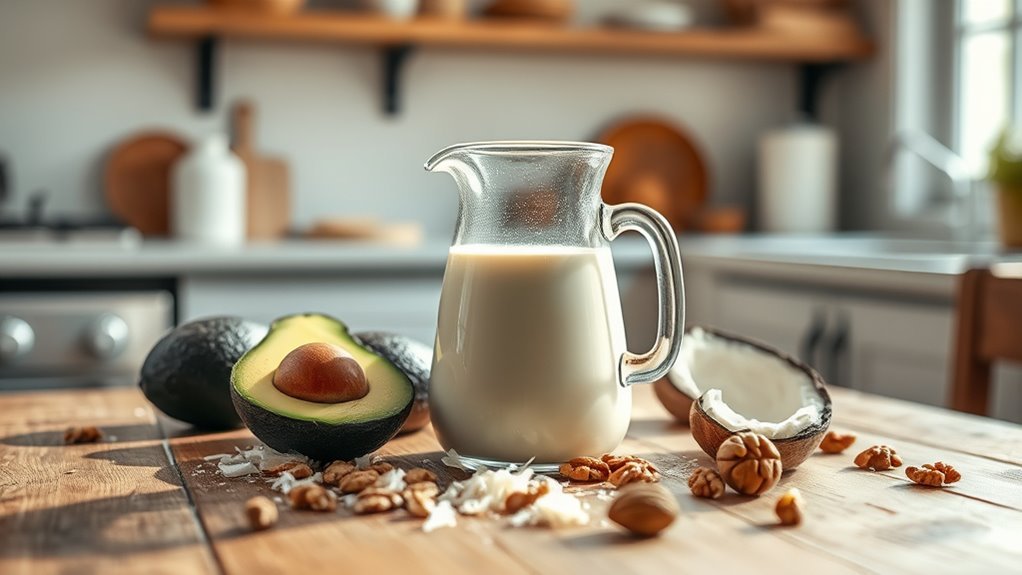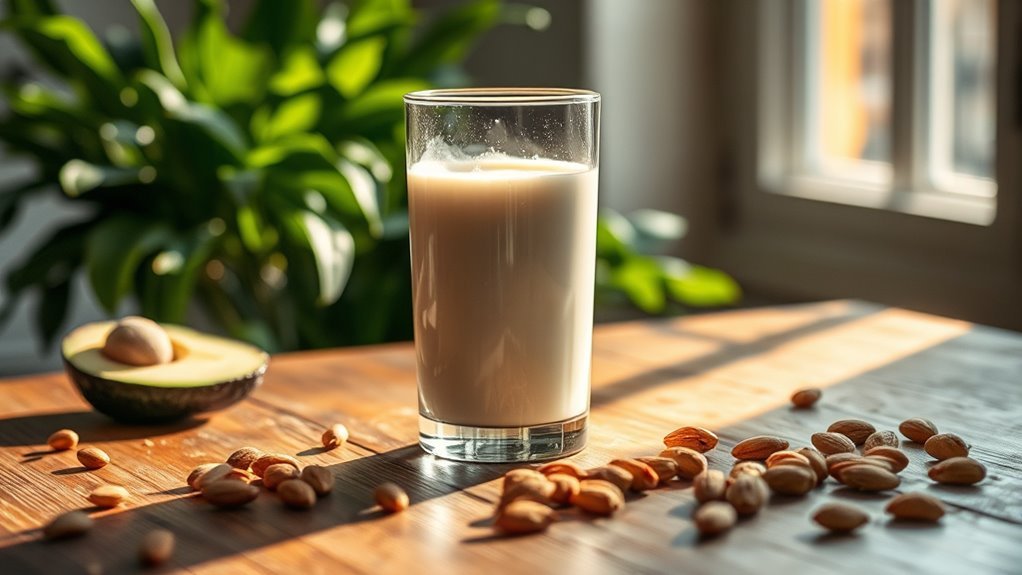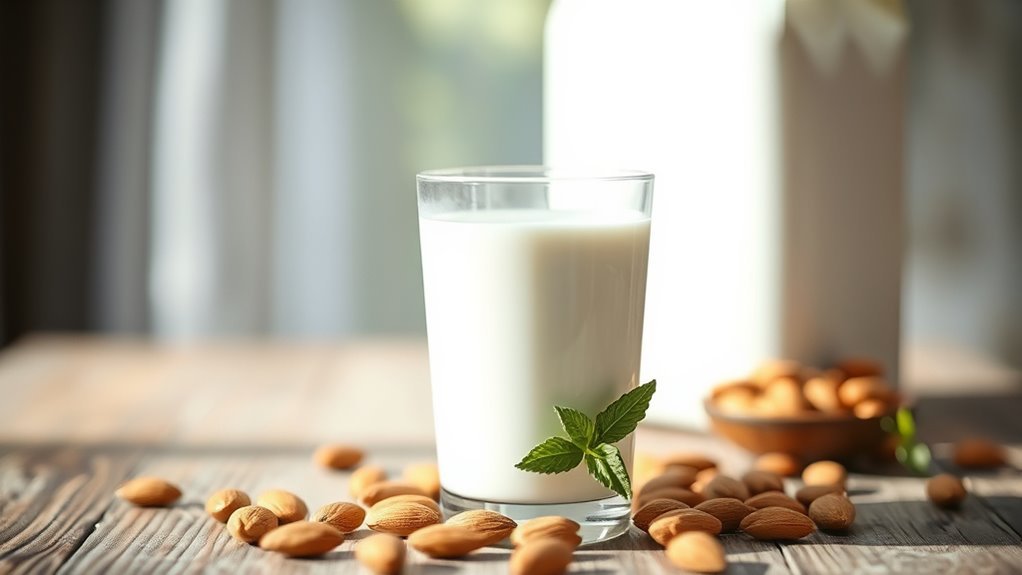You might want to avoid milk on a keto diet because it’s high in carbohydrates, primarily from lactose. This can spike insulin levels and disrupt ketosis, the metabolic state where your body burns fat for fuel. While whole milk has about 12 grams of carbs per cup, there are low-carb dairy options and alternatives that can fit better into your keto lifestyle. Discovering these can help you enjoy dairy-like experiences while staying within your carb limits.
Understanding the Keto Diet Basics

When you commence on the keto diet, it’s essential to grasp its foundational principles to maximize its benefits. The keto diet fundamentals revolve around drastically reducing carbohydrate intake while increasing fat consumption. This shift encourages your body to enter a metabolic state known as ketosis. Understanding ketosis is crucial; in this state, your body efficiently burns fat for fuel instead of carbohydrates. As your body adapts, you may experience increased energy and reduced cravings. However, it’s important to balance your macronutrients, ensuring you meet your nutritional needs without compromising your health. Embracing these principles helps you achieve the freedom to enjoy a satisfying lifestyle while working towards your weight loss or health goals.
Carbohydrate Content in Milk

Although milk is often considered a nutritious beverage, its carbohydrate content can pose challenges for those following a keto diet. A single cup of whole milk contains about 12 grams of carbohydrates, primarily from lactose, which can greatly impact your daily carb limits. For those seeking to maintain ketosis, it’s crucial to be mindful of these carbohydrate sources. Fortunately, there are milk alternatives available, such as almond milk or coconut milk, which typically have lower carbohydrate content and can be more suitable for your dietary needs. By exploring these options, you can still enjoy creamy beverages without derailing your keto goals. Remember, staying informed about the nutritional content of what you consume is key to achieving the freedom you desire in your diet.
The Impact of Milk on Ketosis

Milk’s carbohydrate content can greatly influence your ability to maintain ketosis. When you consume milk, its sugar content—primarily lactose—can hinder your progress towards a state of ketosis. Here are some impacts to take into account:
- Milk digestion: Your body breaks down lactose into glucose, which can spike insulin and disrupt fat-burning.
- Ketosis effects: Increased carbohydrate intake can prevent the body from producing ketones, essential for energy in a keto diet.
- Individual tolerance: Some people may tolerate small amounts of milk, while others may find even a little disrupts their ketosis.
To achieve the freedom you seek in your keto journey, it’s important to monitor how milk affects your state of ketosis and adjust accordingly.
Types of Milk and Their Nutritional Profiles
While various types of milk exist, each brings a unique nutritional profile that can affect your keto diet differently. For instance, whole cow’s milk contains about 12 grams of carbs per cup, which can hinder your ketosis efforts. In contrast, unsweetened almond milk has roughly 1 gram of carbs per cup, making it a popular milk substitute for those on keto. Nutritional comparisons reveal that coconut milk also offers a low-carb option, with about 6 grams of carbs per cup, along with healthy fats. Soy milk, on the other hand, varies widely depending on brands, so check labels carefully. Ultimately, choosing the right milk or milk substitute can help you maintain your keto lifestyle without sacrificing flavor or nutrition.
Lactose Intolerance and Its Role in the Keto Diet
If you’re lactose intolerant, steering through the keto diet can present unique challenges, especially when it comes to choosing milk options. Lactose intolerance symptoms can vary, leading to discomfort if you consume traditional dairy. Understanding these symptoms helps you navigate dairy digestion challenges more effectively.
Consider these key points:
- Digestive Discomfort: Many experience bloating or gas after consuming lactose.
- Nutritional Balance: It’s essential to find alternative sources of calcium and vitamins typically found in milk.
- Keto Compliance: High-carb dairy can impact your ketosis, so choices matter.
Healthier Dairy Alternatives for Keto
When selecting dairy alternatives on a keto diet, it is crucial to prioritize options that align with your nutritional goals and help maintain ketosis. Coconut milk and almond milk are popular dairy substitutes that provide healthy fats and are low in carbohydrates. They also offer various nutritional benefits, such as vitamins and minerals that support overall health.
Greek yogurt, while higher in protein, can also be a great choice if you opt for unsweetened, full-fat versions. Additionally, cheese made from nuts, like cashew cheese, delivers flavor without the lactose found in traditional dairy. By choosing these alternatives, you can enjoy satisfying flavors while adhering to your keto lifestyle, ensuring you feel free and energized on your journey.
Creative Ways to Enjoy Dairy on Keto
If you’re on a keto diet, there are plenty of creative ways to enjoy dairy while keeping your carb intake low. Exploring cheese alternatives, whipping up creamy keto recipes, and choosing low-carb dairy options can enhance your meals without compromising your dietary goals. Let’s look at some delicious strategies to incorporate dairy into your keto lifestyle.
Cheese Alternatives to Explore
Exploring cheese alternatives can open up new culinary possibilities for those following a keto diet. You don’t have to miss out on creamy textures and flavors; there are plenty of delicious options out there. Consider these alternatives:
- Nut cheese: Made from cashews or almonds, it’s versatile and can mimic traditional cheese flavors.
- Coconut yogurt: This dairy-free option is rich and creamy, perfect for adding to smoothies or enjoying on its own.
- Tofu-based cheeses: These can be seasoned to create flavors similar to feta or ricotta.
Creamy Keto Recipes
While the keto diet often emphasizes low-carb foods, it doesn’t mean you have to sacrifice creamy, delicious dishes. You can whip up creamy soups using cauliflower or zucchini as a base, or indulge in cheesy casseroles that satisfy your cravings. For a sweet treat, try keto desserts made with almond flour and rich, creamy textures. Don’t forget your morning coffee! Add a dash of low-carb coffee creamer, or top your drinks with whipped toppings for that extra indulgence. You can also create flavorful creamy sauces and salad dressings to elevate your meals. Pair fresh veggies with creamy dips or enjoy buttery spreads on your favorite low-carb bread. Rich smoothies blended with avocados offer a satisfying option too.
Low-Carb Dairy Options
Incorporating low-carb dairy options into your keto diet can enhance both flavor and texture in your meals, making it easier to stick to your nutritional goals. You don’t have to miss out on dairy, as there are plenty of delicious dairy substitutions available. Consider these low-fat options:
- Greek yogurt: A great source of protein with minimal carbs.
- Cream cheese: Perfect for adding creaminess to dishes without the carbs.
- Coconut milk: A versatile alternative that can be used in smoothies or sauces.
These options allow you to enjoy the rich flavors of dairy while keeping your carb intake low. Embracing these alternatives gives you the freedom to indulge without sacrificing your keto lifestyle.
The Role of Fat in the Keto Diet
Fat serves as the cornerstone of the ketogenic diet, fundamentally shifting your body’s energy source from carbohydrates to fats. This change allows your body to burn fatty acids for energy, leading to various metabolic benefits. By prioritizing fat, you’re not just embracing a new way of eating; you’re also tapping into a natural energy source that can enhance your mental clarity and physical performance.
Here’s a quick overview of fats in the keto diet:
| Type of Fat | Sources | Benefits |
|---|---|---|
| Saturated Fats | Coconut oil, butter | Energy, hormone support |
| Monounsaturated Fats | Avocado, olive oil | Heart health, satiety |
| Polyunsaturated Fats | Fatty fish, nuts | Inflammation reduction |
Embracing these fats can liberate you from traditional dietary constraints.
Tips for Successfully Navigating Dairy Choices on Keto
When steering through dairy choices on a keto diet, it’s essential to focus on low-carb options that fit your macronutrient goals. You might also consider lactose-free alternatives, especially if you’re sensitive to dairy. By making informed choices, you can enjoy the benefits of dairy without compromising your keto plan.
Low-Carb Dairy Options
While steering through the keto diet, you’ll find that choosing low-carb dairy options can greatly enhance your meals without jeopardizing your carbohydrate limits. Incorporating the right dairy can provide essential nutrients and flavor. Here are some excellent choices:
- Low carb cheese: Varieties like mozzarella, cheddar, and cream cheese are delicious and versatile.
- Keto yogurt: Opt for full-fat Greek yogurt or unsweetened varieties, which can be used in smoothies or as a base for dressings.
- Heavy cream: Perfect for adding creaminess to dishes and coffee while keeping carbs low.
Lactose-Free Alternatives
How can you enjoy dairy on a keto diet without the discomfort of lactose? You’ve got plenty of lactose-free alternatives to choose from. Plant-based milks like almond milk, cashew milk, and hemp milk offer creamy textures without the carbs of regular milk. Coconut cream is a fantastic option for adding richness to recipes or beverages. If you’re looking for something versatile, soy milk can be a solid choice, while oat milk and rice milk are generally higher in carbs, so use them sparingly. Consider flax milk for its omega-3 benefits. By incorporating these nut milks and alternatives, you can enjoy dairy-like experiences on keto without compromising your lifestyle or dietary goals.
Frequently Asked Questions
Can I Consume Heavy Cream on a Keto Diet?
Can you enjoy heavy cream on a keto diet? Absolutely! Heavy cream offers several benefits, including high fat content and low carbohydrates, making it a perfect addition for ketosis. It’s versatile too—use it in coffee, sauces, or desserts. If you’re looking for keto cream alternatives, consider coconut cream or almond milk, but heavy cream is hard to beat. So, indulge a little and savor the creamy richness while staying on track!
What Are the Best Non-Dairy Milk Options for Keto?
When considering non-dairy milk options for keto, nut milk is a fantastic choice. Almond and coconut milk are low in carbs, making them ideal for your keto smoothies. They also offer nut milk benefits, like healthy fats and vitamins. Just watch the added sugars in some brands. By choosing unsweetened varieties, you can enjoy creamy, delicious smoothies while staying within your carb limits and embracing the freedom of a keto lifestyle.
Does Cheese Contain Carbohydrates Like Milk?
Yes, cheese does contain carbohydrates, but the amount varies by cheese type. For instance, hard cheeses like cheddar typically have lower carbohydrate content, around 1 gram per ounce, while soft cheeses like ricotta can have more. If you’re monitoring your carb intake, it’s essential to check the nutritional labels. Overall, most cheeses fit well into a low-carb lifestyle, allowing you to enjoy their rich flavors without compromising your dietary goals.
Is Almond Milk a Good Choice for Keto?
Almond milk can be a great choice for your keto diet, offering low carbs and fewer calories compared to traditional milk. Its nutritional benefits include healthy fats and vitamin E, which support overall health. If you’re looking for almond milk alternatives, consider unsweetened versions, as they have minimal added sugars. Just keep an eye on portions to guarantee it aligns with your keto goals. Enjoy the freedom to explore different options while staying within your macros!
How Can I Get Calcium on a Keto Diet?
Imagine your bones as a sturdy castle, needing fortification. On a keto diet, you can still find calcium sources that keep your castle strong. Think leafy greens like kale and broccoli, or indulge in keto alternatives like sardines and almonds. Don’t forget about fortified plant-based milks, which can offer calcium without the carbs. With a little creativity, you can maintain your calcium intake while enjoying the freedom of a keto lifestyle.
1. Why is milk typically avoided in a keto diet?
Milk is generally avoided in a keto diet because it contains lactose, a natural sugar that can raise carbohydrate intake. The primary goal of a keto diet is to achieve ketosis, a metabolic state where the body burns fat for fuel instead of carbohydrates. Consuming milk may hinder this process due to its carbohydrate content, making it challenging to stay within the desired daily carb limit.
2. Are there any alternatives to milk that are keto-friendly?
Yes, there are several keto-friendly alternatives to traditional milk. Options include unsweetened almond milk, coconut milk, and cashew milk, which generally have lower carbohydrate content. Additionally, heavy cream is a popular choice in keto diets due to its high fat content and minimal carbs. Always check labels to ensure there are no added sugars in these products.
3. Can I consume cheese or other dairy products on a keto diet?
Yes, many cheeses and dairy products can be included in a keto diet. Hard cheeses like cheddar, mozzarella, and parmesan are low in carbs and high in fat, making them suitable options. However, it’s important to monitor portions, as some dairy products can still contain carbs. Full-fat yogurt and sour cream can also be consumed in moderation.
4. What are the potential effects of consuming milk while on a keto diet?
Consuming milk on a keto diet can lead to exceeding your daily carbohydrate limit, which may prevent you from reaching or maintaining ketosis. This can result in reduced fat burning, increased cravings for carbs, and potential weight loss plateaus. Additionally, some individuals may experience digestive issues if they are lactose intolerant, which can further complicate adherence to the diet.
5. How can I ensure I’m getting enough calcium on a keto diet without milk?
You can obtain calcium from various keto-friendly sources besides milk. Leafy greens like kale and spinach, cruciferous vegetables like broccoli, and nuts such as almonds are excellent sources of calcium. Additionally, incorporating low-carb, high-calcium foods such as sardines and fortified non-dairy milks can help meet your calcium needs while keeping your carb intake low.
References
- https://www.healthline.com/nutrition/keto-diet-and-dairy
- https://www.ncbi.nlm.nih.gov/pmc/articles/PMC6019055/
- https://www.mayoclinic.org/healthy-lifestyle/nutrition-and-healthy-eating/expert-answers/keto-diet/faq-20472616
- https://www.webmd.com/diet/what-is-the-keto-diet
- https://www.clevelandclinic.org/health/diet-nutrition/what-is-the-keto-diet
- https://www.nutrition.org.uk/healthyliving/healthyeating/keto-diet.html
- https://www.verywellfit.com/what-is-the-keto-diet-5186358


